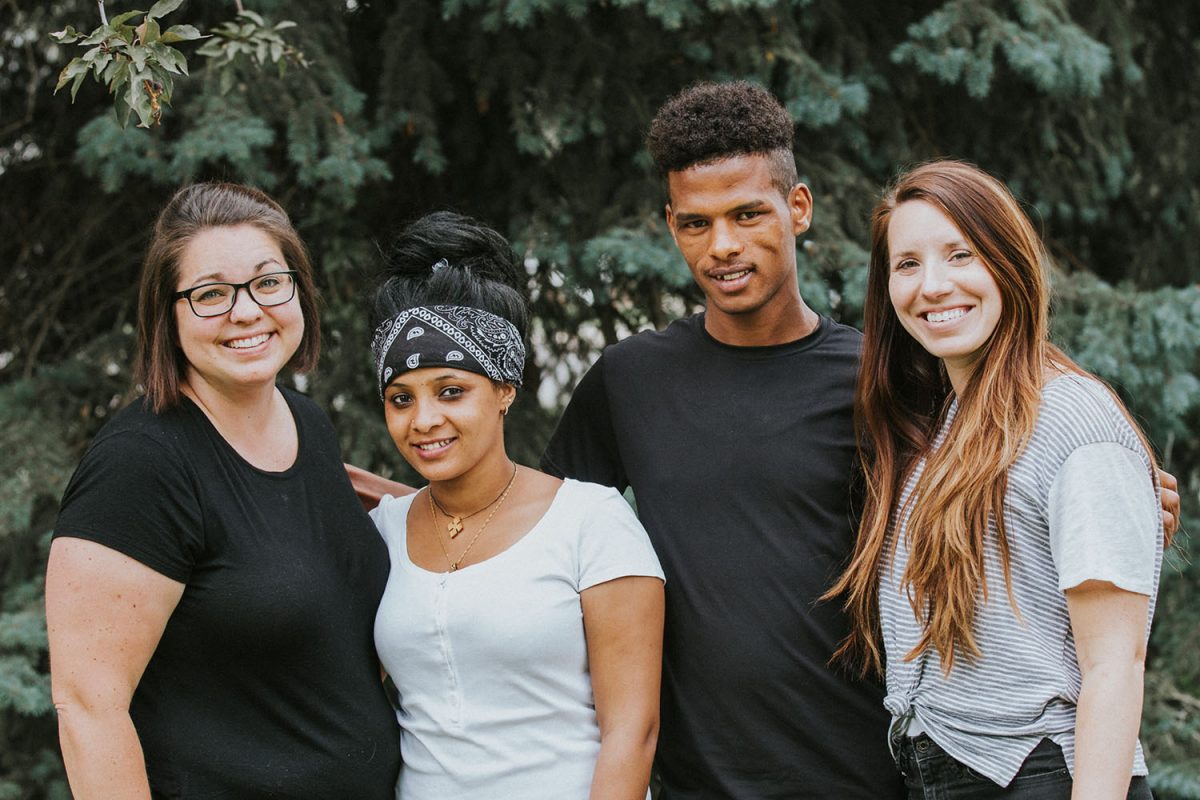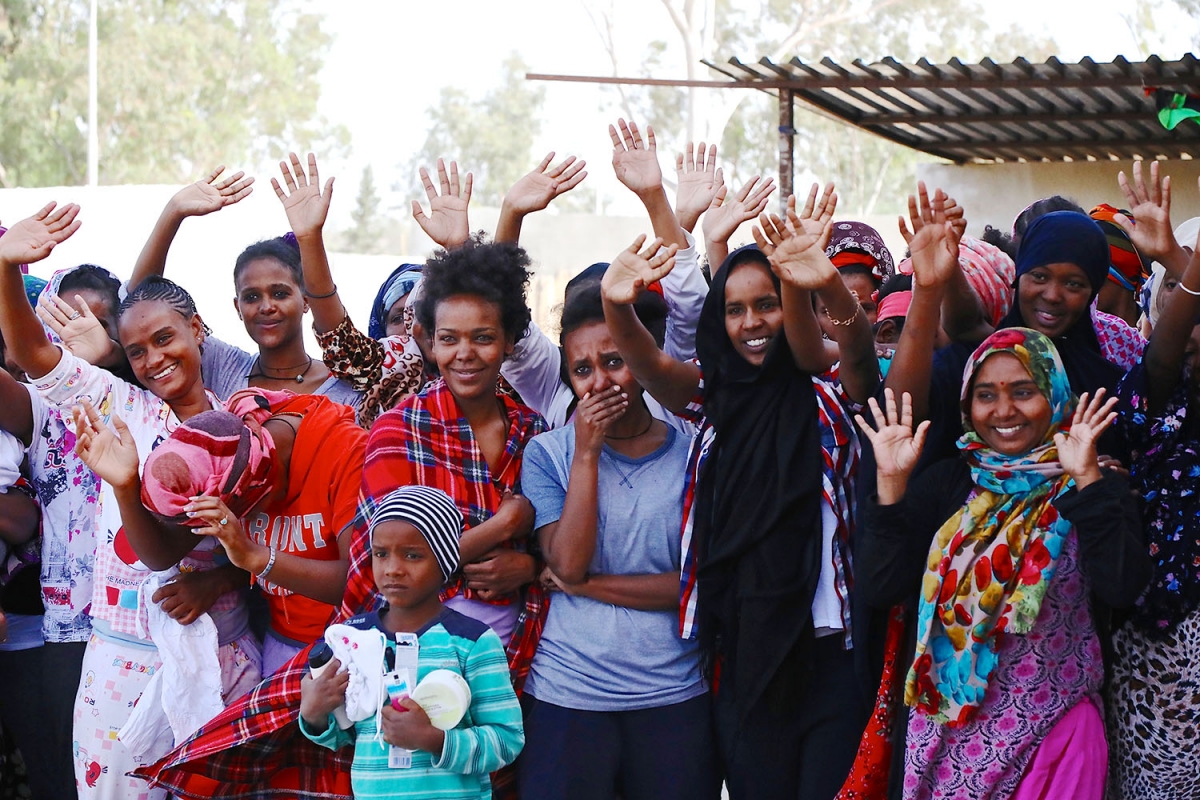“The Bravest People I Know” – Unaccompanied Minors Resettled From Niger to the U.S.

By Francesca Pierigh *
A story of courage, resilience and new beginnings — this is how Natalie describes the journey of her two teenage foster children, Tedros and Yorusalem. Originally from Eritrea, the boy and girl belong to a larger group of unaccompanied minors who have been resettled to the United States after being evacuated from Libya to Niger.
“Learning the language is challenging and communication can be difficult sometimes, but everything else is easy. Our mum is showing us around and teaching us all sorts of things,” says Tedros, a young Eritrean boy with an easy smile.
Tedros and his cousin Yorusalem arrived in Salt Lake City in late 2018 when they were still underage. Their journey started much earlier, however. They left Eritrea in July 2016, travelling to Libya via Sudan.
They belong to a group of unaccompanied minors and vulnerable people who were evacuated out of Libya to Niger by the UN Refugee Agency (UNHCR). In Niamey, Niger’s capital city, they underwent a long, strict interview and vetting procedure before being resettled to the United States.
UNHCR established an emergency transit center in Niamey to respond to the needs of those evacuated out of Libya, among others. The majority of refugees there come from Eritrea, Ethiopia, Somalia, South Sudan and Sudan. Nearly 50% of them are women and children, including unaccompanied minors.
The International Catholic Migration Commission (ICMC) has been closely involved with this operation, deploying 11 resettlement, child protection and refugee status determination experts who work at the UNHCR’s center in Niamey. These experts deal with resettlement procedures and undertake child protection activities for a population which, for the most part, is composed of survivors of torture or other forms of violence.
Tedros and Yorusalem attend 12th grade at a local school in Salt Lake City and are working hard to learn English. “I like to watch movies, comedies especially. That helps with learning the language,” says Yorusalem. On the other hand, socializing and making friends is not very hard, although sometimes she finds it frustrating not being able to communicate well with her schoolmates.
The two teenagers participate in sport activities. Yorusalem is a soccer fan and practices twice a week. When asked about her favorite team, she does not hesitate: Arsenal, she says in a heartbeat. Tedros is a biking fan; an enthusiast of the Tour de France, he loves to cycle himself.
One of the strangest experiences for them was their first contact with the food in the U.S. “When we arrived, our mum took us for burgers and pizza. It was very strange; it tasted a little bit too sweet. But now we have adapted, and I even like cheese pizza,” laughs Tedros. “And we can also cook our food, which is great.”
“I teach them English, they teach me Tigrinya. And thanks to them I’ve tasted so many amazing Eritrean meals,” says mom Natalie, a social worker who assists war veterans and a single mother who loves her multicultural home.
“I’ve always been interested in other cultures, so fostering unaccompanied minors coming from outside the U.S. seemed like a natural step. I also love meeting Tedros’ and Yorusalem’s friends and families from other communities. Everybody is welcome in my house.”
The U.S. Conference of Catholic Bishops (USCCB), in coordination with the U.S. State Department and the Department of Health and Human Services, works with local affiliate organizations to find foster families for resettled unaccompanied minors. USCCB is one of nine voluntary resettlement agencies operating in the U.S. In Salt Lake City, the Catholic Community Services (CCS) of Utah is USCCB’s local partner, responsible for matching families and minors. The organization counts on a wide network of foster families and has a long experience in supporting them.
In 2018, USCCB and its affiliates took care of 54 unaccompanied minors out of the total of 115 minors who were resettled in the U.S. The number of unaccompanied minors is significantly smaller than the overall number of refugees resettled, though even the latter figure is decreasing due to current U.S. Government policies. Last year, only a bit more than 22,000 refugees were resettled to the United States, compared to nearly 85,000 two years earlier.

Resettlement remains one of the key durable solutions identified by UNHCR and is especially important for particularly vulnerable refugees such as unaccompanied minors, though it is not limited to them.
“What I miss most about Eritrea is my family,” says Tedros, and Yorusalem concurs. For both, many of their relatives are still in the country. “But we can talk to them on the phone from here. And we like to listen to Eritrean music, which brings back memories.”
Eritrea is the ninth largest country of origin of refugees worldwide and the second when it comes to unaccompanied minors.
A small country in eastern Africa, it has only known one president since it became an independent nation in 1993. Isaias Afwerki, a former leader in the independence struggle against Ethiopia, maintains tight control over his country, where there is neither free press nor any political opposition.
Young people have few options: remain and be conscripted into indefinite military service — which in many cases equals forced labor, inhumane conditions and torture — or flee. About one fifth of the population has fled the country.
Many of them, like Tedros and Yorusalem, end up in Libya, where they are often detained for long periods of time in conditions which have been described by humanitarian organizations as “inhumane”. Overcrowded facilities, abusive and degrading treatment of detainees and even worse forms of violence are all too common for people trapped in Libya, and are some of the reasons why UNHCR established the evacuation program in the first place.
“I am not sure yet about what I want to do, but I am set on continuing my education,” says Yorusalem, who is also looking for an after-school job. Tedros’s goal is to become a pharmacist.
“This experience has been amazing, and I receive a lot of support from CCS. These kids are incredible and having them with me brings meaning to my life,” says Natalie. “I absolutely recommend the experience to anyone.”
The fact that the unaccompanied minors are teenagers or young adults is perceived as a challenge for some prospective foster families. However, Natalie is determined to continue receiving teenagers. “They are great,” she says matter-of-factly. She has already received a third unaccompanied minor in her house, Carmel, from the Democratic Republic of the Congo.
- Learn more about ICMC’s deployment scheme
- Read more about USCCB’s Foster Care Program for Unaccompanied Children
- Learn more about becoming a foster parent for unaccompanied refugee minors
* Francesca Pierigh is a freelance communications and research consultant.